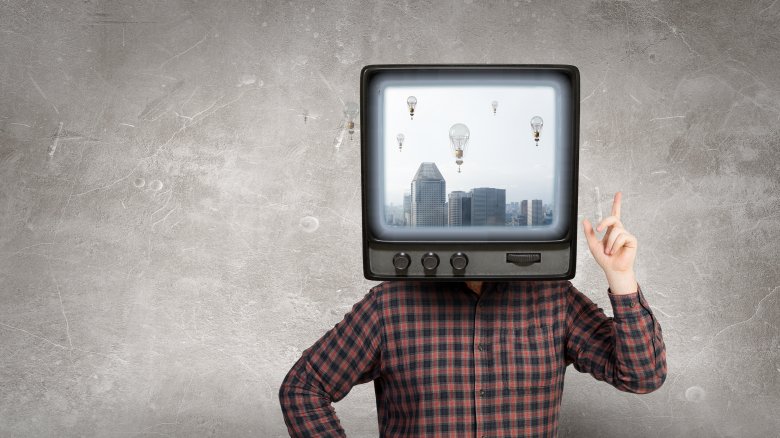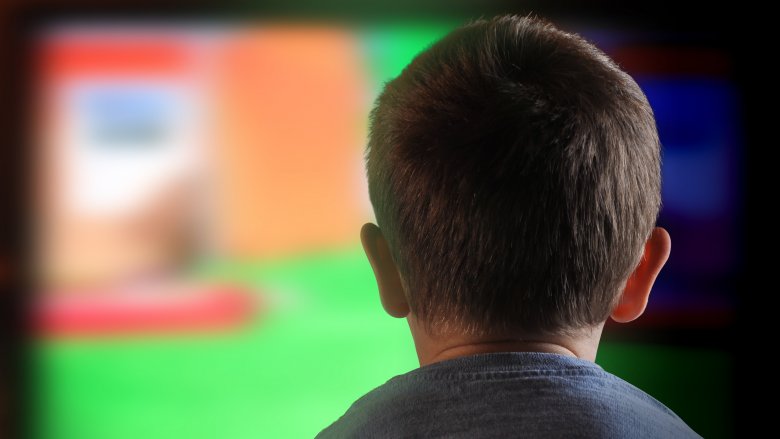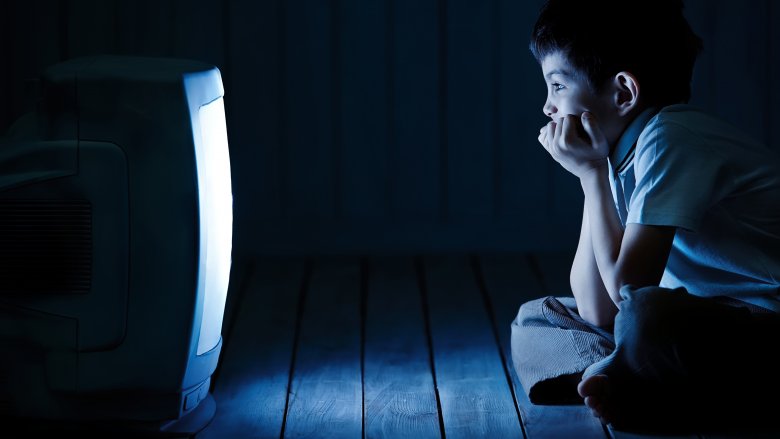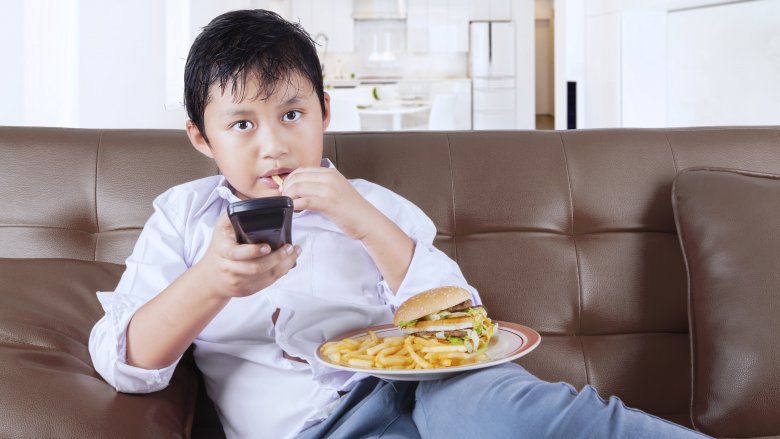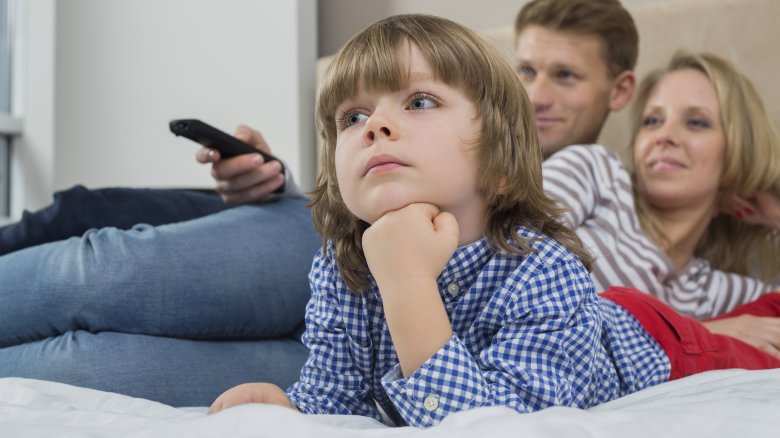Things You Believed About TV That Ended Up Being Wrong
It's been called "the boob tube" and "the idiot box," and smug people love to randomly bring up the fact they don't have one. Because somehow the fact that you don't have a television totally belongs in a conversation about wildlife conservation or your kid's next field trip, but whatever. We've all spent many years being told that TV will rot your brain, destroy your eyes, and eat your children while they sleep, but is any of it true? It might surprise you to hear that most of what you thought you knew about TV — or rather, most of what was beaten into your head by smug people and your mom — is actually pure fiction, sort of like most primetime television shows.
TV makes you dumb
Although no one can argue that kids definitely have that vacant, my-brain-cells-are-dying expression on their faces when they're watching SpongeBob, it's probably not true that TV rots your brain, makes you dumb, or even lowers your IQ. According to The Washington Post, high-quality programming like Blues Clues or Sesame Street can actually help kids learn numbers and letters, and those findings are consistent across multiple studies.
There are also problems with a lot of the studies that correlate television with school performance or lowered IQ — Slate reported in 2006 that most of them simply compare TV-watching kids in the general population with non-TV-watching kids but fail to take into account the fact that those groups often live in considerably different households. For example, kids who watch hours of TV a day tend to come from lower-income families than kids whose TV-watching habits are restricted by their parents. So there's no way of knowing if it's the television that affects school performance, or if it's other factors in their environment, like food insecurity or the absence of a parent.
Really, the only way to know for sure is to look at the past — compare the test scores of kids who grew up with TV to those who grew up before TV, and see if there's a difference. Guess what: a 2006 study found that there isn't. Now someone just needs to look at test scores pre-SpongeBob and post-SpongeBob.
TV makes people violent
So it is true that some television programming can make kids more aggressive. By the mid-1990s there were already at least 217 independent studies that looked at the association between TV and social behavior, and most of them concluded that violent programming + kids = bad. But that's not an indictment of all television, even though there are plenty of people who interpret it that way.
According to Medical News Today, a 2013 study found that it isn't television in general that's the problem, but violent programming in particular. When the 3- to 5-year-old kids in the study were exposed to a "diet" of educational programs like Sesame Street and Dora the Explorer, they showed less aggressive behavior overall than the kids in the control group, who were on the full-fat, high-calorie version of violent television programming. So the lesson here is not to turn off the television but to turn the channel.
That's alright for preschoolers, but what about adults? According to a 2012 article in Psychology Today, "'Violent tendencies reside within the personality, whether or not the person watches programming depicting violence." So provided you can make it through your first 18 years without turning into a savage roadrunner or Sideshow Bob, you should be able to binge watch Dexter without having to worry that you might attract your own Dark Passenger.
TV is bad for your eyes
Remember how your mom was always telling you to sit like 27 feet away from the TV because "it will ruin your eyes?" Well, now you can call your mom and tell her you'll be sitting exactly 6 inches away from the TV from now on, so there.
That's right, bust out the popcorn and pull up your chair because it's time to celebrate. TV doesn't ruin your eyes. The eye-ruining myth, says Scientific American, goes all the way back to the 1960s, when General Electric released some new super-high-tech ultra-awesome color TV that was basically like a box of plutonium. Those sets, which were recalled almost as soon as they were released, emitted about 100,000 times as much radiation as was considered safe. So yeah, sitting 6 inches away from those TVs probably would have ruined your eyes. And also your pancreas, liver, and capacity for bearing children.
The worst thing that modern television sets will do to your eyes in make them tired, and tired eyes are a completely reversible condition that can be cured by ... drumroll ... sleeping!
What you should be concerned about it is what close television viewing might say about your child. A kid who sits too close to the TV won't become nearsighted, but being nearsighted might be the reason why that kid is sitting so close to the TV. So it's a good idea to have your child's eyes checked if your child is regularly invading the TV's personal space.
TV can help you go to sleep
You've probably got at least one friend who insists that television is a sleep aid. And while it's true that some people have trained themselves to drift off to the dulcet sounds of the evening news or zombies eating people alive, the quality of sleep those people get is probably not very high.
According to PsychCentral, television is stimulating, so watching it right before bed is exactly the opposite of what you really ought to be doing. Compare the way your brain reacts to some classical music and a warm bath with the way it reacts to a horde of living corpses. Which one of those experiences more closely resembles a lullaby?
What about after you've already fallen asleep? TV is just white noise, isn't it? Actually that's not true, either. The National Sleep Foundation says sound can have a huge negative impact on sleep continuity, and far from being true "white noise," television sound is constantly changing. There are moments of quiet, moments of drama, moments where the dialogue rises and falls, moments where feasting zombies are making those horrible squelching noises. Any change in the volume or amount of sound can jar you out of your normal sleep cycle, even if you aren't consciously aware of it. Anyway, it's much more satisfying to be conscious during those zombie attacks, even if you also have to cover your eyes.
TV makes you fat
Yes, it's true that lots of studies have linked television to the rising obesity epidemic, especially in children. But it's not strictly true that television is to blame. The act of plopping your butt down on the living room sofa and switching on the tube won't instantly cause fat cells to have a party in said butt. It's absolutely possible to watch TV every day and not turn into a less-yellow version of Homer Simpson.
What does contribute to higher rates of obesity among TV-watching children is a combination of watching snack commercials on the TV and also eating snacks in front of the TV. According to The Washington Post, a 1999 study at Stanford University discovered that kids who reduced their television consumption didn't actually go on to become more active, but they did lose weight. That's an indicator that TV alone isn't the problem; it's the combination of TV and overeating. In 2005 a Harvard University study found that kids eat an average of 170 extra calories for every hour of TV they watch, and almost all of those calories come from foods they've seen advertised on TV. And when was the last time you saw a TV ad for baby carrots or spinach salad during a kids' show?
So really, the solution isn't to banish your TV, it's to get a DVR and teach your children to skip the commercials. And maybe limit TV time snacking to just baby carrots and spinach salad.
TV can give kids ADHD
The problem with a lot of scientific research is that pesky causation problem. In a research study, it's often difficult, if not impossible, to definitively say which factor caused the other factor, or if the two factors are even related.
That is exactly what's happening with research that claims to show a link between ADHD and television. According to About Kids Health, there is really only one study that came to that conclusion — a 2004 study published in the journal Pediatrics, which caused TV vilifiers everywhere to become obnoxiously and unreasonably giddy. But as it turned out, the study had several major flaws, including a failure to differentiate between fast-paced, non-educational television and learning programs like Mr. Rogers. It also did not distinguish between diagnosed cases of ADHD and kids who had general attention problems, and it even tracked symptoms that aren't associated with ADHD, like "obsessive concerns" and "confusion." But perhaps most damning of all was the study's failure to consider whether kids with ADHD might just be drawn to TV because it represents an escape from activities that are harder for them to focus on. Or maybe parents of kids with ADHD are just more stressed out than average moms and dads, so they're more likely to use the TV as a temporary babysitter. All together now: "Correlation does not imply causation." Principles to live by.
TV is bad for your emotional health
It's easy to imagine that someone who sits alone in front of the TV late into the night might be a pretty sad and lonely figure, but in fact the opposite is true. In 2009, Scientific American reported that television can actually fend off loneliness, and is a particularly effective method for coping with relationship issues like a breakup or an argument.
There's even a name for that close, personal relationship you have with Jon Snow from Game of Thrones: it's called a "parasocial" relationship, and it's a real experience, just like your relationship with that other guy who so totally does not compare in any way to your King in the North parasocial boyfriend. As it turns out, when you follow a television character over the years, you become deeply involved in that character's personal life, and you come to know their personality and history as intimately as you often do with actual, live people.
In a 2009 study published in the Journal of Experimental Social Psychology, researchers found that people who watched television reported feeling less lonely during the viewing experience. And participants who experienced a "relationship threat" were able to fend off feelings of rejection and negativity by indulging in a favorite TV show. So what's the real takeaway from this? If Jon Snow parasocially breaks up with you, you should totally get with Daryl on The Walking Dead.
TV leads to less family interaction
Television haters like to think that TV-watching families are totally disassociated from one another, and that they have a set in every room and sit isolated and alone watching different programs, with drool leaking from the corners of their mouths. That nightmarish post-apocalyptic scenario might be happening in some families, but for the most part families who view television together on a single set experience more feelings of family togetherness and less drool overall.
A 2014 study published in the Journal of Adolescent Research found that kids who watch TV with their parents actually benefited from the experience. Family time in front of the TV was "positively associated with general family functioning (for girls), parental involvement (for both boys and girls), and adolescent disclosure to parents (for boys)." That means that television (gasp) actually got parents and teenagers to talk to each other. In other words, watching Stranger Things with your kids can lead to lively discussions about demogorgons, Winona Ryder, and what the hell is going on with Eleven's hair this season. That doesn't sound like highly intellectual conversation or anything, but compared to the back of your teenager's head as she flounces off to her bedroom, it's like a minor miracle.
TV is bad for society
Perhaps most shocking of all, television can actually be a force for good. Not just because it can teach people how to survive the zombie apocalypse, but because history has also shown that it can teach people about the real world.
According to the Paley Center for Media, television helped advance the civil rights movement in the 1960s by exposing large numbers of people to national coverage of racial issues. TV helped unify Southern African-Americans, who for the first time had regular access to information about what was happening outside their own neighborhoods. Likewise, television helped unite the nation after the assassination of John F. Kennedy. The Atlantic reported that it was the first time Americans learned about events in real-time, from the moments just after the shooting to the death of Lee Harvey Oswald.
And finally, according to Encyclopedia.com, American TV might have helped end the Cold War — some historians think that broadcasts featuring images of freedom and prosperity in America were instrumental in bringing down the Soviet Union. How many humans do you know of who can put "demolished Communism" on their resume? TV can't be all bad.
TV is low-quality entertainment
In the early days of television, shows followed a standard formula — each episode fit neatly into its half-hour or one-hour time slot, with room for commercials, and by the end viewers were rewarded for their time with a satisfying conclusion. It was a nice little package that could later be re-run out of sequence with other episodes in the series, and no one would notice.
That might be why TV got such a bad rap as a junk medium. Even today you can hear people lamenting television programming as time-sucking garbage, but you'll hardly ever hear anyone say that an afternoon at the movies is wasted time, unless they're talking about Suicide Squad, because that's 2 hours and 3 minutes you'll never get back. And yet moviemakers have a fundamental creative problem that TV writers and producers don't: limited time.
According to Jason Mittell, professor of film and media culture, former filmmakers are often drawn to the small screen because of the broader storytelling opportunities. When you have 10 60-minute episodes to work with, you can spend time developing characters and building complex plots and plot twists. How much of that can you do in a 120-minute film? Not nearly as much.
Modern TV is not only high quality, it's often better quality than even the best movies. That's not really factoring in the Keeping up with the Kardashians of the genre, though, which may be one reason why the myth of poor-quality television persists.
TV is a dying medium
While it is true that most American teenagers have permanently hunched necks and strange, glowing, rectangular objects growing from the palms of their hands, it's not true that teenagers are abandoning their old friend and companion the TV in favor of new media. According to a 2009 Nielsen report, teenagers used their smartphones, laptops, and other devices not as a replacement for television but as a supplement to it.
Now, television viewership was actually down about 10 percent in 2015, according to Consumerist, but again, it wasn't because people were trading small screens for smaller screens, and it certainly wasn't because of a rise in smug, TV-shunning families. TV viewership has declined because people are watching a different kind of TV — the Cabletelevision Advertising Bureau blamed streaming services like Amazon Prime and Netflix, which is really like saying that car ownership is down because people are driving more SUVs. It's not, it's just that modern people prefer a different kind of car.
Sadly, none of this will ever convince Mr. and Mrs. Smug to welcome the television back into their homes, even though you can bet that Mr. and Mrs. Smug are always first in line at the Apple Store when the latest iPhone comes out. Don't ask why smartphones don't rot brains the way TVs do because they just don't. And anyway, they need those smartphones for business. Just pretend like you didn't notice all the cat memes.
